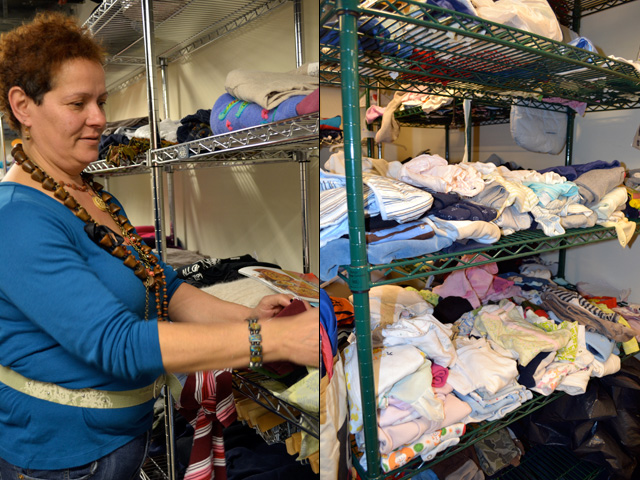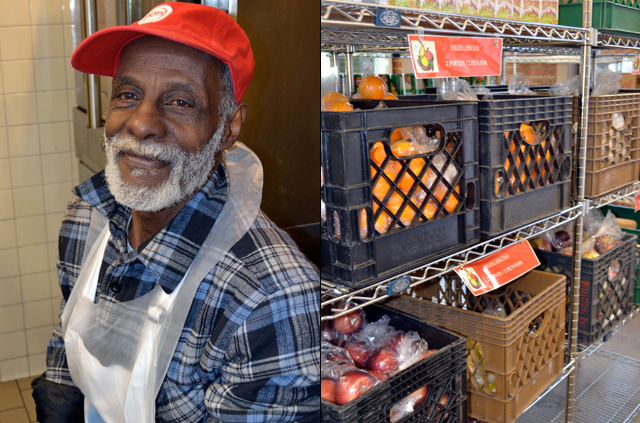Unsung Soup Slingers

By Jaquelyn Johnson
Bronx Journal Staff Writer
With the highest hunger rate in the nation and unemployment hovering around 10 percent, many Bronx families are struggling. Asking for help can be very difficult and even humiliating for some. Part Of The Solution, or POTS, offers Bronxites a judgement-free zone where people in need can get more than just a hot bowl of soup.
“We have people that come in here faithfully — you get to know people on a first-name basis,” says staff member Ashley Monet, 39. “They become a part of you and hopefully you become a part of them.” POTS is a community-based, non-profit organization intent on “nourishing the basic needs and hunger of those in the Bronx.”
Sister Mary Alice Hannan founded POTS in 1982, starting with just a soup kitchen. Located at 2759 Webster Avenue, it now offers 10 different services, with plans to expand those within the next few months. POTS runs a food pantry that provides groceries for more than 250 families weekly. It provides case management, legal representation and a barber once a week. It also has a clothing closet, showers and a mailbox system that is currently being used by 902 people.
POTS currently has 16 full-time employees and seven part-time. The majority of the staff are volunteers. On average, 15 a day work there; about 1000 serve in a year. Some of these volunteers originally came to POTS seeking assistance.
The Bronx, which has the congressional district with the highest hunger rate in the nation, is in clear need of the services POTS provides. Executive Chef Oliver Johnson, 66, serves about 350 meals a day. Johnson, himself once a client of POTS, says, “As soon as we run out, we get creative.” Rather than turn away clients, volunteers find a way to make do with what they have, seeing that everyone who walks through the doors is offered a warm meal. During my visit, lunch was franks, a baked potato and a healthy serving of cabbage.
“Me and my brothers didn’t know it was a soup kitchen. We thought it was a restaurant,” says Taina Rodriguez, who later became a food coordinator at POTS. The kitchen, open seven days a week, has 13 café tables and 56 seats. It feels more like a bistro than a soup kitchen. A poster on the wall is inscribed, “The love that we give away is the only love that we keep.”
Adjacent to the kitchen is the pantry. Clients are allowed to choose from a vast range of necessary items such as vegetables, dairy, grains, fruits and protein once a month, by appointment only. The pantry works on a points system and aims to provide what client members need to sustain their households. Those unable to make an appointment are given an emergency bag stocked with food such as rice or pasta, cereal, canned vegetables, dairy or protein.

Some of the organizations that contribute food and services to POTS are the Robin Hood Program, NY Cares Program, Dear Santa Program, The Urban Justice Center, City Harvest and The Food Bank of NYC. Individuals also donate professional services. Barber Mr. Cedeno gives free haircuts on Tuesdays for 20 to 25 people, starting at 9:30 a.m.
“If you use all the programs that we offer, you can end up stable and successful,” says James Brannigan, 54, POTS basic programs coordinator. Brannigan coordinates the shower service and clothing distribution. Three private showers in the basement of the facility offers private use for individuals between 8:30 a.m. and 10:30 a.m. Monday through Friday. Each client is given a personal care kit that includes a toothbrush, soap and other essentials. Those in need of clean clothes are given a set.
“We could use more men’s clothing, shoes, jeans, boots and sneakers,” says Norma, 62, who assists in sorting the donated clothing. The clothing center’s shelves are lined with women’s and children’s attire, usually abundant, thanks to generous donors. In contrast, there is a scarcity of men’s clothing, and men comprise the majority of clients who come for the showers.
“I don’t have money, but I have enough love to give, and sometimes that’s all that’s missing,” says Maria Ramirez, 54, coordinator of the clothing program. After 17 years at POTS, Maria explains that her helping those in need doesn’t stop when she goes home at night. Rather, it flows into the streets and trains when she stumbles across those who may need assistance.
Thursdays POTS has a legal clinic. Signup is at 12 noon for intake starting 1 p.m. and ending at 3 p.m. Michael Leonard, 29, and other volunteers from legal organizations help review housing, immigration and public-assistance cases.
“We work to help those clients that need assistance with terrible conditions in apartments, public assistants benefits being terminated, denial for disability and food stamps,” says Leonard. At 1 p.m., the line was out the door of the 14-by-14-foot waiting room.
The majority seeking legal aid were Latino. Teresa De La Rosa, 51, needed help with her housing situation. She explained that at one point, she was living in a shelter with her two children, one who is autistic. When the city began building homes for those in the shelter, she decided to move in, because the city was paying her rent. As of December, however, the city stopped paying. De La Rosa could not make the rent and the city is now suing her for $1500 in back payment. With no one to watch her children, De La Rosa is unable to find work, and thus has turned to POTS for legal aid.
Her housing trials are not unique, says Leonard. “I’m impressed by my clients, by the resilience that they have against a system that seems to stand in their way,” he says.
The POTS staff do what they can to help the clients who walk in every day. However, their ultimate hope is to do such a good job that POTS will be unnecessary. “And,” says Taina Rodriguez, “it gets to the point where people don’t need us.”
